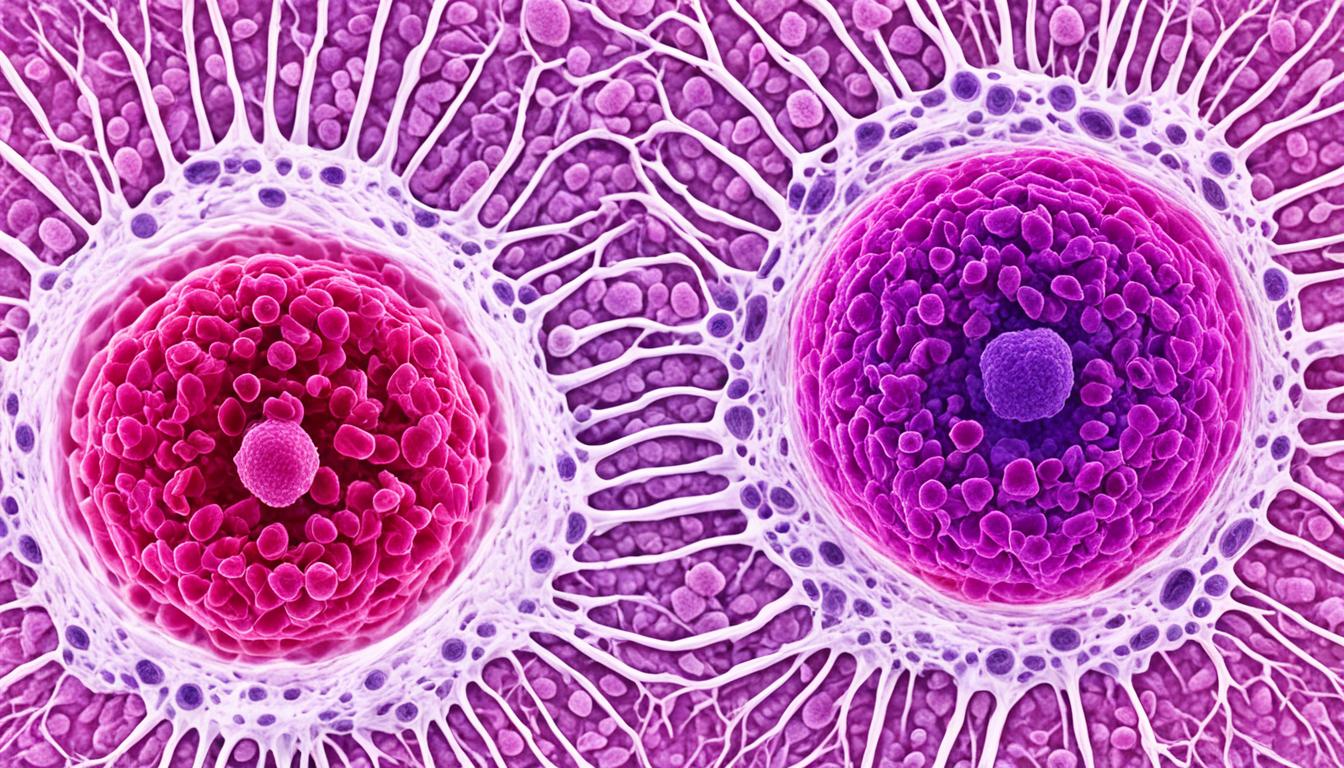Thyroid cancer targets the thyroid gland in the neck’s front. It forms from specific cancers or after their treatments. Some who beat Hodgkin lymphoma, brain tumors, or childhood cancers are more likely to get thyroid problems. Risks go up with radiation near the thyroid, pituitary gland, or from certain drugs.
Thyroid issues might show up as growths, too much thyroid hormone (hyperthyroidism), or too little (hypothyroidism). Doctors check for these problems through exams, blood tests, and scans. The way they help you depends on the issue. It could mean taking medicine, having surgery, or twirling out your thyroid.
Stem cell therapy could be a new way to tackle thyroid cancer. These cells can grow into thyroid ones and help fix the tissue. Scientists are working hard to find out more about this treatment.
Key Takeaways
- Thyroid cancer affects the thyroid and can come from other cancer types or their treatments.
- If you’ve fought Hodgkin lymphoma, brain or spinal cord tumors, or had cancer as a kid, look out for thyroid problems.
- Doctors mostly spot thyroid issues with exams, blood work, and scans.
- Treatment for these issues can range from medicines to surgery or removing the thyroid.
- Stem cell therapy is a promising option for thyroid cancer, helping the body build new tissue.
Causes and Risk Factors for Thyroid Cancer
Thyroid cancer has many causes and risk factors. A big one is from cancer treatments, especially radiation therapy. If patients get radiation to their head, neck, upper chest, or spine, they have a higher chance of thyroid issues. This includes getting thyroid cancer. How much radiation they get and their age during treatment affects the risk level.
Others include having total body irradiation (TBI) before a stem cell transplant. Radioactive iodine (radioiodine) therapy and high doses of metaiodobenzylguanidine (MIBG) for neuroblastoma raise the risk too. Some drugs can also make it more likely to have thyroid problems. These include alkylating chemo, tyrosine kinase inhibitors, certain antibodies, and inhibitors of the immune system.
Thyroid surgery can also cause problems, including making thyroid cancer likelier.
If you’ve had cancer treatments, it’s smart to check your thyroid health often. Knowing the risks can help find and treat thyroid cancer early.
| Risk Factors | Associated Procedures/Treatments |
|---|---|
| Radiation therapy | Head, neck, upper chest, or spine radiation |
| TBI (Total Body Irradiation) | Performed before stem cell transplant |
| Radioiodine therapy | Common in the treatment of thyroid conditions |
| MIBG (Metaiodobenzylguanidine) | Used for neuroblastoma treatment |
| Drug therapies | Alkylating chemotherapy drugs, tyrosine kinase inhibitors, monoclonal antibodies, immune checkpoint inhibitors |
| Thyroid surgery | Removal of the thyroid gland |
Stem Cell Therapy for Thyroid Cancer Management
Stem cell therapy is a new way to manage thyroid cancer. It uses stem cells that can become many cell types, including thyroid cells. This offers the chance to repair and regenerate thyroid tissues. Research has shown that stem cells can help the thyroid work better.
Induced pluripotent stem cells (iPSCs) and adipose-derived stem cells (ADSCs) are two types under study. iPSCs come from adult cells and can become thyroid cells. ADSCs are found in fat and can also help repair thyroid tissues.
Using stem cells to help heal nerves after thyroid surgery is also being looked at. Surgery can damage nerves, but stem cell therapy might help them heal and work right again.
In a new approach, researchers are growing thyroid tissues in 3D using stem cells. This method creates a space like the thyroid’s own, so stem cells can turn into real thyroid cells. This and other methods show promise in making the thyroid work properly again.
Although still experimental, stem cell therapy shows a lot of potential for thyroid cancer care. It may bring new hope and better results for those with this disease. Scientists are hard at work, trying to make these advances help patients in real ways.
Conclusion
Thyroid cancer is a challenging illness that can greatly affect people’s health and happiness. The causes and risks are not fully understood, but certain treatments and drugs can make someone more likely to get it. Despite these risks, there’s hope. Stem cell therapy is a new and exciting method being explored for the management of thyroid cancer.
Stem cell therapy shows promise because it can turn into thyroid cells and help grow new tissue. This method is still in the research stage. But, scientists are looking into how well it works and if it’s safe to use.
Thanks to the ongoing improvements in stem cell technology, there’s the potential for big benefits for people with thyroid cancer. More studies will help us learn how effective and safe stem cell therapy really is. And this could lead to better ways to manage thyroid cancer.

